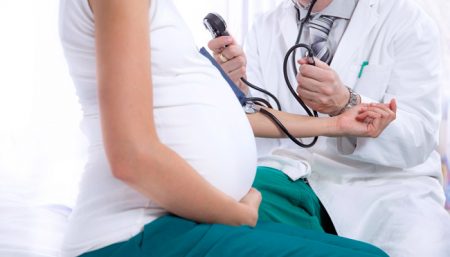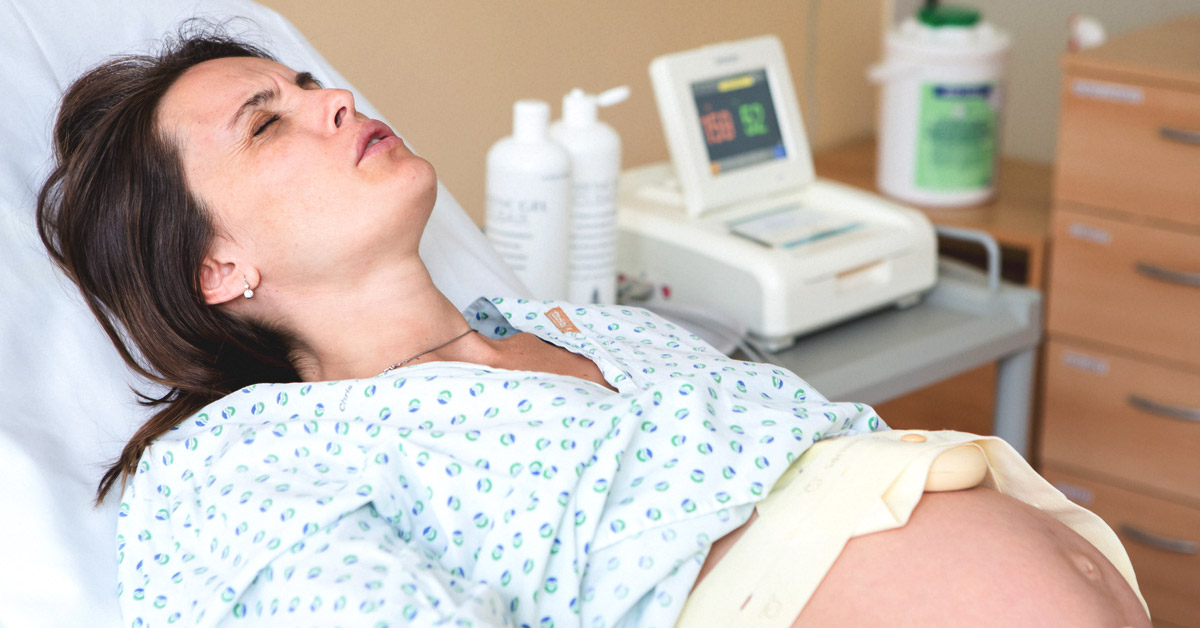High Blood Pressure
Some women have hypertension before they become pregnant. This is called chronic hypertension. Many more develop hypertension during pregnancy. This is referred to as pregnancy-induced hypertension (PIH). PIH generally goes away soon after delivery. About 8 percent of pregnant women have some form of hypertension. Make sure your doctor knows if you have a history of high blood pressure. A systolic reading of 140 or higher, or a diastolic reading of 90 or higher is considered high blood pressure.

Mild high blood pressure that is controlled with exercise, diet, or low does of medications may cause no complications at all during pregnancy. A recent British study suggested that some high-risk women (including women who had preeclampsia in a previous pregnancy) may be able to reduce their risk of preeclampsia by taking vitamins C and E through the second half of pregnancy. However, extremely high blood pressure that is not under control during pregnancy can cause such complications as delayed growth of the fetus, preeclampsia (high blood pressure accompanied with retention of fluid and leaking of protein into the woman’s urine is called preeclampsia ) preterm labor (Labor that occurs before the 37th week of pregnancy), placental abruption (It occurs when the placenta that is implanted normally inside the uterus separates prematurely from the wall of uterus, usually during the third trimester of pregnancy), and low birth weight.
In addition to having more frequent checkups to measure your blood pressure, your may also have ultrasound examinations to monitor the growth of the fetus. The physical stress of pregnancy may raise already elevated blood pressure in women who have reduced kidney function that has resulted from high doctor will recommend more frequent blood and urine tests during pregnancy to monitor the functioning of your kidneys.
Backache
Nearly every woman experiences backaches and back pain at some time during pregnancy, especially as her abdomen gets bigger. You may experience backache after walking, bending, lifting, standing or excessive exercise. Be careful about lifting–do it correctly, with knees bent and back straight.
Backache is treated with heat, rest and analgesics, such as acetaminophen (Tylenol ®). Some maternity girdles may provide support. Keep your weight under control, and participate in mild exercise, such as swimming, walking and stationary-bike riding. Lie on your left side when resting or sleeping.
Lower-back pain is common during pregnancy, but occasionally it indicates a serious problem, such as a kidney stone. If pain is constant or severe, discuss it with your healthcare provider.
Varicose Veins
Varicose veins often can develop in the legs, external genitals, or abdominal wall, especially when there is a family history of this complication. Wearing elastic support stockings and raising your legs when possible can help prevent and alleviate varicose veins.

Headaches
Hormonal changes may be the cause of headaches during pregnancy, especially during the first trimester. Some women experience more headaches during pregnancy but hesitate to take medication for them. You can do a few things that are medicine-free to relieve headaches.
- Use deep-breathing exercises and relation techniques to help you relax.
- Drink plenty of fluids so you don’t become dehydrated.
- Close your eyes and rest in a quiet place.
- Eat regularly.
- Avoid foods or substances, such as cheese, chocolate and caffeine, that sometime cause headaches.
- Apply an ice pack to the back of your head
- Get enough sleep.
If your headache doesn’t go away using these techniques. you may take regular or extra-strength acetaminophen (Tylenol ®). If this doesn’t help, call your healthcare provider.
Sciatic-Nerve Pain
Some women occasionally experience a severe pain in their buttocks and down the back or side of either leg. This pain is called sciatic-nerve pain; it may occur more frequently as pregnancy progresses.
The sciatic nerve is located behind the uterus, in the pelvic area, and it runs down into the leg We believe pain is caused when the enlarging uterus puts pressure on the nerve. The best way to deal with the pain is to lie on your opposite side. This helps relieve pressure on the nerve.
Yeast Infections
Due to hormone changes and increased vaginal discharge, also called leukorrhea, a pregnant woman is more susceptible to yeast infections. Yeast infections are characterized by a thick, whitish discharge from the vagina and itching. Yeast infections are highly treatable. Always consult your physician before taking any medication for this condition.
Disclaimer
The Content is not intended to be a substitute for professional medical advice, diagnosis, or treatment. Always seek the advice of your physician or other qualified health provider with any questions you may have regarding a medical condition.



